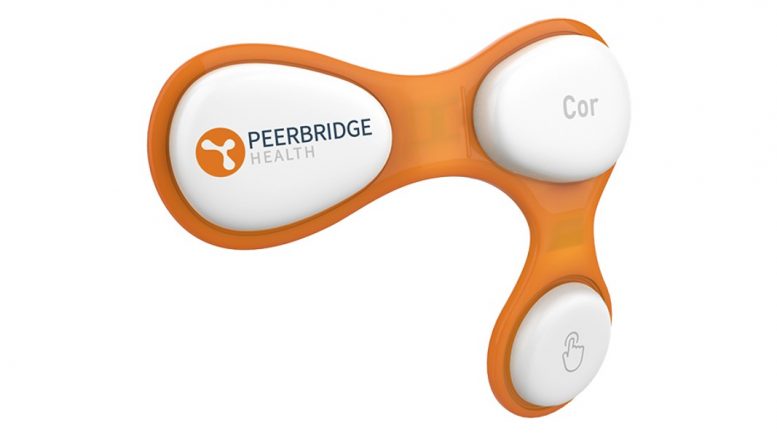Low-cost, Patient-friendly Platform Can Improve Patient Outcomes While Reducing Healthcare Spending
Peerbridge Health, developer of a hospital-grade, remote diagnostic platform that harnesses AI to detect early signs of heart failure, has released the results of a recent feasibility trial showing its technology had a nearly 96% accuracy rate in identifying heart failure in patients utilizing ECG as the only input.
Patients in the clinical trial wore the company’s AI-enabled Peerbridge Cor™ 3-lead, 2-channel wireless ambulatory ECG patch at home anywhere from three to seven days. Leveraging five-minute windows of electrocardiogram signals, the Peerbridge platform was able to determine whether an individual patient had heart failure (HFpEF or HFrEF) with 95.7% accuracy.
More than 6 million Americans are living with heart failure, and each year around 1 million new cases are diagnosed in adults 55 years of age and over. Heart failure is the second-leading cause of hospitalization in the U.S. (after sepsis) and the leading cause of hospitalization among adults 65 and older. Eighty percent of initial heart failure diagnoses will come only after an emergency hospital visit. Less than half of these patients will survive more than five years.
The Peerbridge Health platform offers a seamless at-home monitoring option that provides results much faster and at lower cost, reducing patient burden and enabling more frequent assessments. For patients, the period from initial outreach to their primary care provider through an appointment with a cardiologist and testing to a confirmed diagnosis can take upwards of 11 to 15 weeks. Peerbridge can deliver an accurate diagnosis in under 30 minutes at a fraction of the cost of traditional diagnosis.
More than 45 million people in the U.S. have Stage B, or asymptomatic, heart failure and don’t know it. Finding and treating heart failure early not only saves lives, it helps avoid the costly readmission cycle for heart patients that contributes billions of dollars to our nation’s annual healthcare costs.
“As a physician, the ability to intervene for patients before an emergency visit represents a significant opportunity for patient health,” said Dr. Brian Kolski, MD, Director of Structural Heart Disease at Saint Joseph Hospital in Orange County, Calif., and a principal investigator on the feasibility trial. “It also allows us to inexpensively expand our care to patients who currently aren’t being reached.”
Given the significant shortage of cardiologists that is anticipated to compound over the next few years and the rising cost to Medicare of heart failure, it is imperative that our healthcare system finds a way to detect heart failure early, inexpensively and with availability to everyone. The Peerbridge platform provides this simple, patient-friendly solution.
“The current diagnostic process for heart failure is slow and expensive,” said Peerbridge Health CEO and President Chris Darland. “We know that early detection can save lives, and our platform delivers a cost-effective and easily deployed solution that accurately identifies this disease quickly, positively impacting patient outcomes. We’re excited that the feasibility study illustrates exceptional efficacy.”
A full pivotal trial of the Peerbridge Cor platform is slated for the fall.

